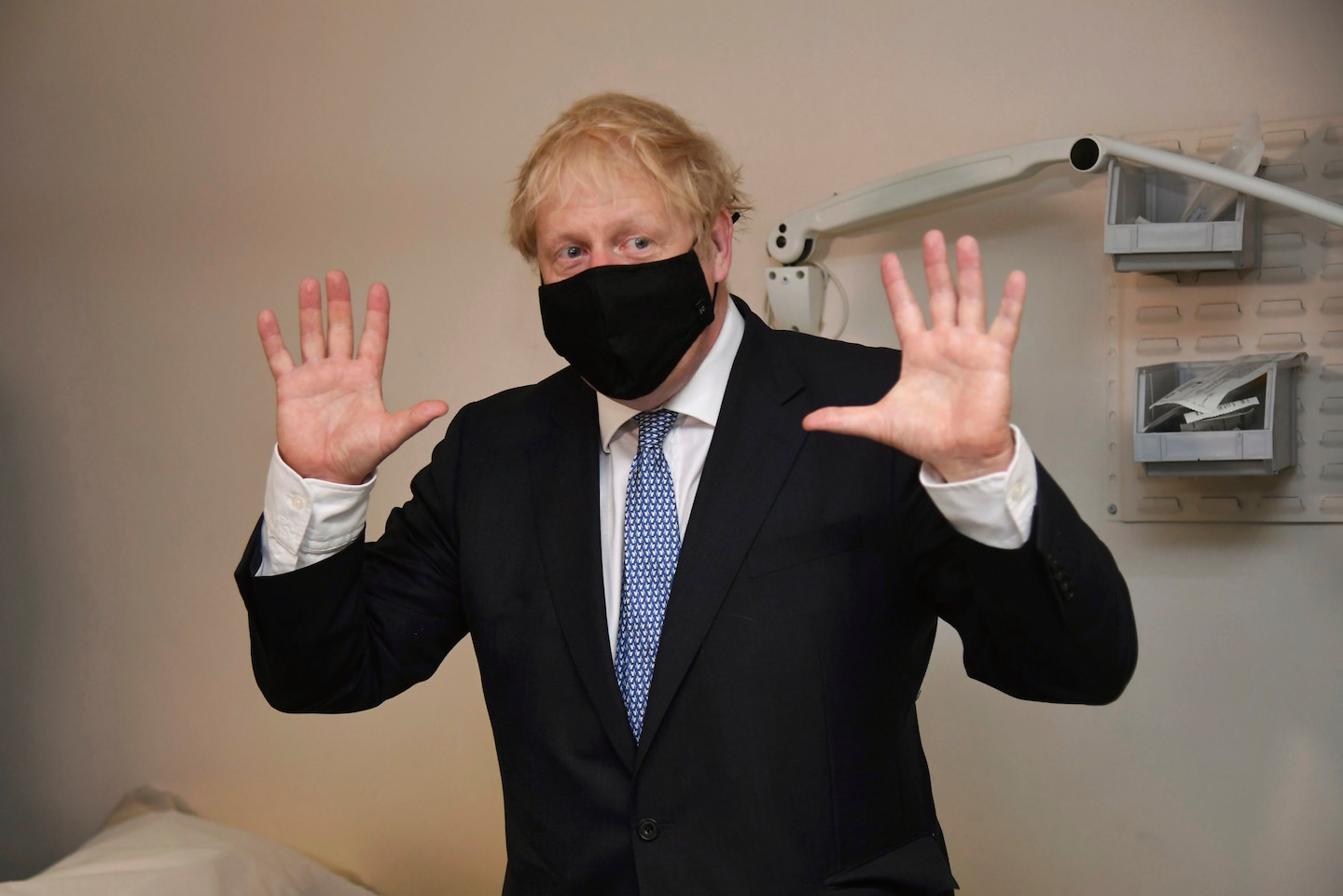Boris Johnson says ‘I was too fat’ as he launches anti-obesity campaign

“I was too fat,” Johnson says in the video, about his physique back in April when he was sick with covid-19, the disease caused by the novel coronavirus, and rushed to a hospital to be saved by supplemental oxygen.
He says he’d struggled with his weight for ages. But since recovering from the coronavirus, he has begun to focus more on exercise, starting his days with “quite a gentle run.” He notes that he has lost more than 14 pounds. And he encourages Brits to join him in his effort.
Embracing the role of weight watcher in chief is a bold move for a 56-year-old leader who has boasted his favorite meal is a plate of English sausages, plural, and a good Tignanello red from Tuscany.
It is also a somewhat unusual stance for Johnson, as a longtime critic of the so-called “nanny state.”
He tried to assure Brits on Monday that he wasn’t trying to force anything on them.
The point of the new anti-obesity campaign is “just trying to help people a little bit to bring their weight down — not in an excessively bossy or nannying way, I hope,” the prime minister said.
He added, “We want this one to be really sympathetic to people, to understand the difficulties that people face with their weight, the struggles that many, many people face to lose weight, and just to be helpful.”
The British newspapers, though, didn’t seem to buy any nuance in Johnson’s approach.
“Boris Johnson orders GPs to be brutally honest with patients about their weight,” the Sun headline read, about general practitioners. The Daily Mail went with: “Boris Johnson orders obese people to get on their bikes and lose weight.”
Some on social media appreciated Johnson’s effort — and promised to accompany him on his “weight journey.” Others were dismissive, even cruel, posting fat-shaming memes and videos of the prime minister huffing and puffing in his rumpled running outfits.
During Monday’s press briefing, political reporters tried to drill down on precisely how much the prime minister weighed. Johnson has, in effect, invited the Westminster press pack to forever keep close tabs on his waist size.
Government officials were evasive.
“I don’t have anything for you on that I’m afraid,” a 10 Downing Street spokesman said in response to a call from The Washington Post.
Johnson is sending the country to the scale at a stressful time, when Britons have been hunkering in place for months, jawing on comfort food. Britain has reopened its pubs — but not the gyms.
England is the second “fattest country” (their words, not ours) in the Organization for Economic Cooperation and Development (OECD) — a 37-member club for mostly well-off democracies. The first is the United States — and, according to projections, the proportion of people overweight is growing.
The British government’s new strategy includes a ban on junk food advertisements on television before 9 p.m. — so children are not bombarded by ads for fatty snacks. Other promotions, such as “buy one get one free,” are banned, as is displaying candy bars in prominent positions in stores.
The government hopes this saves lives. Almost 8 percent of critically ill patients with covid-19 in intensive care units are morbidly obese. About 3 percent of the British population is morbidly obese and a third is clinically obese, which may increase their risk of developing more serious complications from the virus.
“This deadly virus has given us a wake-up call about the need to tackle the stark inequalities in our nation’s health, and obesity is an urgent example of this,” said Health Secretary Matt Hancock.
Writing in the Daily Telegraph, Hancock said that if everyone who is overweight lost five pounds, the National Health Service could save more than $130 million over the next five years.
Some businesses said the new regulations would have little effect beyond hurting companies that are already trying to recover from the economic effects of the lockdown.
Sue Eustace, director of public affairs at the Advertising Association, told the BBC that the United Kingdom already had some of the “strictest” advertising rules in the world.
“Children’s exposure to high fat, salt, and sugar adverts on TV has fallen by 70 percent over the last 15 years or so, but there’s been no change to obesity, so we don’t think these measures are going to work.”
Graham MacGregor, professor of cardiovascular medicine at Queen Mary University of London, noted that the measures announced Monday were largely focused on marketing.
“I wouldn’t see it as a major revolution to beat obesity, but it’s certainly a positive step,” he said.
He added that this campaign was likely to have less impact than efforts by previous British governments, including salt reduction targets and a “sugar tax” that resulted in manufactures reducing the sugar in soft drinks.
“These are very clever maneuvers,” MacGregor said, “because people go on buying the same rubbish, but it’s got less of the sugar or less salt or less fat. And, if it’s done slowly, they don’t actually realize.”
Johnson has opposed those types of interventions in the past.
In his leadership race last year, he vowed to review “sin taxes” on unhealthy food and alcohol. He recently told the Times Radio that “in the great anthology of embarrassing former articles that people always drag up . . . you will find I have taken a sort of very libertarian stance on obesity.”
That stance seemed to shift somewhat on Monday. Though Johnson might need to work a bit more on his sales pitch.
“The great thing about going for a run at the beginning of the day,” he said, “is that nothing could be worse for the rest of the day.”






